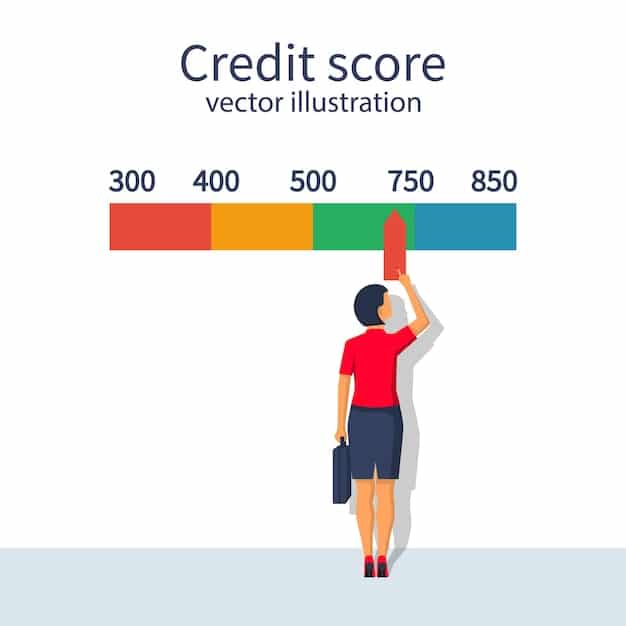Boost Your Credit Score: A Comprehensive Guide to Reaching 750+

Understanding Your Credit Score: A Comprehensive Guide to Reaching 750+ involves grasping the components of your credit score, employing strategies to improve it, and maintaining good financial habits to achieve and sustain a high credit rating.
Want to unlock better interest rates, loan terms, and financial opportunities? Understanding Your Credit Score: A Comprehensive Guide to Reaching 750+ can help you navigate the complexities of credit scores and achieve your financial goals.
Understanding the Basics of Your Credit Score
Your credit score is a numerical representation of your creditworthiness. It’s a crucial factor that lenders, landlords, and even employers use to assess your financial responsibility. Understanding what makes up your credit score is the first step towards improving it.
Let’s delve into the key components of your credit score and how they influence your overall creditworthiness.
What is a Credit Score?
A credit score is a three-digit number that reflects your credit history. It ranges from 300 to 850, with higher scores indicating a lower credit risk. Several credit scoring models are used, but the most common are FICO and VantageScore.
Why is it Important?
A good credit score can unlock numerous financial benefits. It can help you qualify for lower interest rates on loans and credit cards, secure better terms on mortgages, and even rent an apartment more easily. A poor credit score can lead to higher interest rates, denied applications, and financial limitations.

Key Factors Influencing Your Credit Score:
- Payment History: Paying your bills on time is the most critical factor. Late payments can significantly lower your score.
- Amounts Owed: The amount of debt you carry relative to your credit limits (credit utilization ratio) also plays a significant role.
- Length of Credit History: A longer credit history generally leads to a better score, as it provides more data for lenders to assess.
- Credit Mix: Having a mix of different types of credit accounts (e.g., credit cards, loans) can positively impact your score.
- New Credit: Opening too many new credit accounts in a short period can lower your score.
Understanding these components allows you to focus on areas that need improvement. Consistent on-time payments, managing your debt, and maintaining a healthy credit mix are essential for building a solid credit score.
Assessing Your Current Credit Score
Before you can start improving your credit score, you need to know where you currently stand. Accessing your credit report and understanding what it contains is essential for identifying areas that need attention.
Let’s explore how to check your credit score and understand the information in your credit report.
How to Check Your Credit Score
There are several ways to check your credit score. Many credit card companies offer free credit scores to their customers. Additionally, you can use free online services like Credit Karma or Credit Sesame to monitor your credit score regularly.
Accessing Your Credit Report
You are entitled to one free credit report from each of the three major credit bureaus (Equifax, Experian, and TransUnion) every 12 months. You can request your free credit report at AnnualCreditReport.com.
Understanding Your Credit Report
Your credit report contains detailed information about your credit history, including your payment history, credit accounts, and any public records like bankruptcies or liens. Reviewing your credit report carefully can help you identify errors or inaccuracies that may be negatively impacting your score.
- Personal Information: Verify that your name, address, and other personal information are accurate.
- Credit Accounts: Review your credit accounts to ensure that all accounts listed are yours and that the payment history is correct.
- Public Records: Check for any public records that may be listed, such as bankruptcies, foreclosures, or tax liens.
- Inquiries: Note the inquiries listed on your report, as too many hard inquiries can lower your score.
By regularly checking your credit score and reviewing your credit report, you can stay informed about your credit health and take proactive steps to address any issues.
Strategies for Improving Your Credit Score
Improving your credit score requires a strategic approach and consistent effort. By implementing effective strategies and making positive financial changes, you can gradually boost your credit score.
Let’s explore some proven strategies for improving your credit score and achieving your financial goals.
Pay Bills on Time
Paying your bills on time is the single most important factor in improving your credit score. Set up automatic payments or reminders to ensure that you never miss a due date. Even one late payment can negatively impact your score.
Lower Your Credit Utilization Ratio
Your credit utilization ratio is the amount of credit you’re using compared to your credit limit. Aim to keep your credit utilization below 30%. For example, if you have a credit card with a $1,000 limit, try to keep your balance below $300.

Dispute Errors on Your Credit Report
If you find errors or inaccuracies on your credit report, dispute them with the credit bureaus. Provide documentation to support your claim. The credit bureaus are required to investigate and correct any errors.
Become an Authorized User
If you have a friend or family member with a credit card and a good payment history, ask if you can become an authorized user on their account. Their positive payment history can help improve your credit score.
- Consistent Payments: Ensure all bills, including utilities and rent, are paid on time.
- Debt Management: Implement a debt management plan to pay down high-interest debt.
- Budgeting: Create a budget to track your income and expenses and avoid overspending.
By consistently implementing these strategies, you can gradually improve your credit score and unlock numerous financial benefits. Patience and persistence are key to achieving your credit score goals.
Maintaining a High Credit Score Over Time
Achieving a high credit score is a significant accomplishment, but maintaining it requires ongoing effort and responsible financial habits. By adopting strategies to protect your credit and avoid common pitfalls, you can sustain a high credit score over time.
Let’s explore effective strategies for maintaining a high credit score and ensuring long-term financial stability.
Monitor Your Credit Regularly
Continue to monitor your credit score and credit report regularly. This will help you detect any fraudulent activity or errors that could negatively impact your score. Set up alerts to notify you of any changes to your credit report.
Avoid Opening Too Many New Accounts
Opening too many new credit accounts in a short period can lower your score. Each time you apply for credit, a hard inquiry is added to your credit report. Limit your applications to only those that are necessary.
Keep Old Accounts Open
Closing old credit accounts can reduce your overall credit limit and increase your credit utilization ratio. Unless there is a specific reason to close an account, it’s generally best to keep it open, even if you don’t use it regularly.
Diversify Your Credit Mix
Having a mix of different types of credit accounts (e.g., credit cards, loans) can positively impact your score. However, don’t take on unnecessary debt just to diversify your credit mix. Focus on managing your existing accounts responsibly.
- Consistent Review: Regularly review your credit report for inaccuracies and fraud.
- Budgeting: Maintain a budget to avoid overspending and accumulating debt.
- Financial Goals: Set clear financial goals to stay motivated and focused on responsible financial habits.
By consistently monitoring your credit, managing your debt, and avoiding common pitfalls, you can maintain a high credit score and enjoy the financial benefits that come with it.
Common Myths About Credit Scores
There are many misconceptions about credit scores that can lead to confusion and poor financial decisions. Dispelling these myths is essential for understanding how credit scores work and making informed choices.
Let’s debunk some common myths about credit scores and provide clarity on the facts.
Myth: Checking Your Credit Score Will Hurt It
Fact: Checking your own credit score does not hurt it. When you check your own score, it’s considered a soft inquiry, which does not impact your credit score. Only hard inquiries, which occur when you apply for credit, can lower your score.
Myth: Closing Accounts Improves Your Score
Fact: Closing credit card accounts can actually lower your credit score. Closing accounts reduces your overall credit limit, which can increase your credit utilization ratio. It’s generally best to keep old accounts open, even if you don’t use them regularly.
Myth: All Credit Scores are the Same
Fact: There are different credit scoring models, and your score can vary depending on the model used. FICO and VantageScore are the most common, but each uses slightly different criteria to calculate your score. Additionally, different lenders may use different scoring models.
Myth: Income Affects Your Credit Score
Fact: Your income does not directly affect your credit score. Credit scores are based on your credit history, not your income. However, your income can indirectly impact your score by influencing your ability to pay your bills on time and manage your debt.
- Paying with Cash: Paying with cash only does not build credit.
- Debt Consolidation: Debt consolidation can help improve your score if managed responsibly.
- Co-signing Loans: Co-signing a loan can impact your score if the borrower defaults.
By understanding the facts about credit scores and dispelling common myths, you can make informed financial decisions and take proactive steps to improve or maintain your credit health.
Seeking Professional Help and Resources
Navigating the world of credit scores can be complex, and sometimes seeking professional help is the best course of action. Credit counseling and financial education resources can provide valuable guidance and support.
Let’s explore the benefits of seeking professional help and the available resources for credit counseling and financial education.
Credit Counseling Services
Credit counseling agencies can provide guidance on managing your debt, creating a budget, and improving your credit score. Look for reputable non-profit agencies that are accredited by the National Foundation for Credit Counseling (NFCC).
Financial Education Resources
Many organizations offer free or low-cost financial education resources, including workshops, online courses, and educational materials. These resources can help you improve your financial literacy and make informed decisions.
When to Seek Professional Help
Consider seeking professional help if you are struggling to manage your debt, have difficulty understanding your credit score, or need assistance creating a budget. A credit counselor can assess your financial situation and provide personalized recommendations.
- Debt Management Plans: Credit counselors can help you develop a debt management plan to pay off your debt.
- Budgeting Assistance: Counselors can provide guidance on creating and maintaining a budget.
- Credit Score Improvement: Professionals can offer strategies for improving your credit score.
By seeking professional help and utilizing available resources, you can gain the knowledge and support you need to achieve your financial goals and maintain a healthy credit score.
| Key Point | Brief Description |
|---|---|
| ✅ Payment History | Paying bills on time is crucial for a good credit score. |
| 💰 Credit Utilization | Keep credit card balances below 30% of the credit limit. |
| 📈 Monitor Regularly | Check your credit report for errors and fraud. |
| 🚫 Avoid New Accounts | Limit new credit applications to avoid hard inquiries. |
Frequently Asked Questions (FAQ)
▼
A good credit score typically falls between 670 and 739. Scores between 740 and 799 are considered very good, while scores of 800 or higher are considered exceptional. Aiming for a score of 750+ puts you in a strong position for favorable financial terms.
▼
You should check your credit report at least once a year. It’s a good practice to review your report from each of the three major credit bureaus (Equifax, Experian, and TransUnion) to ensure accuracy and detect any signs of fraud.
▼
A credit utilization ratio is the amount of credit you’re using compared to your total credit limit. It’s calculated by dividing your outstanding credit balance by your credit limit. Aim to keep your credit utilization below 30% to improve your credit score.
▼
The timeline for improving your credit score varies depending on your current credit situation and the steps you take. Consistent on-time payments and responsible credit management can lead to noticeable improvements within a few months to a year.
▼
Yes, it’s possible to improve your credit score without a credit card. Paying bills on time and becoming an authorized user on someone else’s credit card can help. Additionally, some credit-building loan programs can help you establish a positive credit history.
Conclusion
Understanding Your Credit Score: A Comprehensive Guide to Reaching 750+ involves consistent effort and responsible financial habits. By grasping the components of your credit score, implementing effective strategies to improve it, and seeking professional help when needed, you can achieve your financial goals and maintain long-term financial stability.





